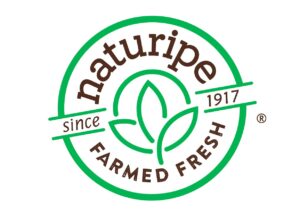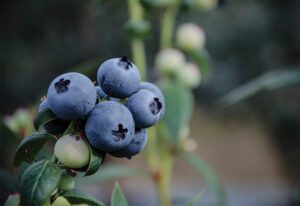Feb 6, 2025Naturipe Farms’ Earth-first philosophy
Naturipe Farms, based in Salinas, California, has built a reputation as a pioneer in berry production since 1917. Today, the company also leads with sustainable practices in vegetable farming, combining innovation, environmental stewardship and more than a century of grower expertise

What began as a marketing cooperative for strawberries has grown into a vertically integrate company owned by four growing organizations. Naturipe’s extensive network now produces strawberries, blueberries, blackberries, raspberries, cranberries and avocados.
As one of the world’s largest producers of organic blueberries, Naturipe maintains year-round production from growing regions in California, Florida, Georgia, Oregon, Washington, Peru, Chile and Mexico. Alongside production, the company emphasizes a focuses on soil health, pollinator support, renewable energy, and food safety.
Earth-first philosophy
“Being organic is one part of the company’s strong commitment to the environment and sustainability,” said Janis McIntosh, director of marketing innovation and sustainability at Naturipe Farms.
 Naturipe growers use many practices to minimize their environmental footprints. From good soil management to state-of-the-art technology, if it makes sense, they will implement it.”
Naturipe growers use many practices to minimize their environmental footprints. From good soil management to state-of-the-art technology, if it makes sense, they will implement it.”
On the farm, these sustainability measures include water management, integrated pest management (IPM), composting, mulching, and the use of drones and other innovative tools.
“In addition, over one-quarter of our production is now packed and cooled with renewable energy,” McIntosh said. “New installations in New Jersey, California and Chile partially contribute to Naturipe lowering its carbon emissions by 100,000 metric tons.”
Naturipe growers also protect pollinator health by installing more than 1,000 acres of habitats throughout North and South America. “Our pruning, composting and chop-and-drop techniques increase soil microbial diversity and improve carbon storage and water retention,” McIntosh said. “Our diversified pollinator habitat programs support our pollinator-reliant crops and the local ecosystem.”
Regenerative agriculture practices
Naturipe incorporates regenerative agriculture into its operations. Several of its crops — including avocados, blueberries, raspberries and blackberries — are grown as no-till crops with live-root systems year-round.
“Cover crops are planted to add additional nutrients and organic matter, such as bacteria, fungi and several other microorganisms, which are crucial to the health and fertility of the soil,” McIntosh said. These regenerative practices, she explained, add to crop longevity and improve soil health.
“For over one hundred years, our family farms have utilized state-of-the-art practices that have allowed them to farm the same land for generations, providing fresh delicious berries to the local markets,” McIntosh said. “Benefits of regenerative practices include soil health, increased pollinator population, reduced water use, composting and dependence on conventional energy.”
Technology driving efficiency
Over the decades, Naturipe has added new technology to improve water conservation, soil health, and efficiency.

“Our growers use precise metered drip irrigation, tiling and mulch systems to reduce their water footprint,” McIntosh said. “Tunnels can be used to extend growing seasons and improve plant and soil quality. Also, we have stringent IPM protocols, including biological, cultural and mechanical controls such as pest vacuums and netting.”
For more than 40 years, growers have relied on drip irrigation to deliver water and nutrients directly to roots, but the technology continues to advance. “Today, we utilize laser-level technology to optimize the delivery of vital nutrients, creating a more homogenous, even crop,” McIntosh said.
She added that drones now deliver predatory mites based on pest pressure, while satellite imagery and AI camera systems enhance field management. “Our grower partner has developed Smartberry, a digital data recording, reporting and visualization platform,” McIntosh said.
Food safety protocols
Naturipe also ensures strict food safety standards across its supply chain. Farms undergo annual audits by third-party certifiers to GFSI (Global Food Safety Initiative) benchmarks and maintain Global GAP or Primus GFS certifications.
“All growers have food safety personnel on-site trained in the latest food safety regulations and procedures,” McIntosh said. “They also have robust IPM and GAP, a good agricultural practices program that guides all daily practices and ensures the best and safest berries are produced and sold. All fields are inspected just before harvest to ensure no contamination has occurred.”
Naturipe records all data in its SAP platform to enable quick traceability of shipments. “This system quickly allows us to find any of our products in minutes,” McIntosh said. Transportation also includes safeguards: “We use an asset-based carrier that tracks the temperature and location of our product in real time to ensure there is no break in the cold chain until it reaches our customers. All products and trucks prior to loading undergo quality checks and inspections.”
Reducing carbon footprint
 Naturipe invests heavily in renewable energy to reduce its carbon footprint. “In 2023, our grower in Chile celebrated the installation of the largest floating solar plant in South America,” McIntosh said. “Also last year, our flagship cooler in Watsonville, California installed rooftop and solar parking canopies to power their operation. In 2024, we are celebrating the installation of six acres of solar panels in Delano, California, powering one of our largest blueberry operations.”
Naturipe invests heavily in renewable energy to reduce its carbon footprint. “In 2023, our grower in Chile celebrated the installation of the largest floating solar plant in South America,” McIntosh said. “Also last year, our flagship cooler in Watsonville, California installed rooftop and solar parking canopies to power their operation. In 2024, we are celebrating the installation of six acres of solar panels in Delano, California, powering one of our largest blueberry operations.”
Social responsibility
Naturipe also demonstrates social responsibility. The company was among the first to sign the ethical charter developed by the International Fresh Produce Association and United Fresh, ensuring farmworker safety and fair treatment. It also participates in the Ethical Charter Implementation Program (ECIP), which provides farm-level assessments and training.
“In addition, many of our farms have also had a third-party social responsibility audit to ensure worker safety and that every worker is treated with respect,” McIntosh said. “While some of our growers are Fair Trade certified, all our growers are active in the communities they grow in. They support local charities, provide much-needed health and dental services, and even build playgrounds and ball fields.”
A long-term commitment
For more than a century, Naturipe has combined tradition with innovation to improve production, soil health, and sustainability. With regenerative farming methods, cutting-edge technology, renewable energy, and food safety protocols, Naturipe continues to lead with sustainable practices in vegetable farming that benefit the environment, workers, and consumers.
— Keith Loria, contributing writer
Keith Loria is an award- winning journalist who has been writing for almost 20 years.
















